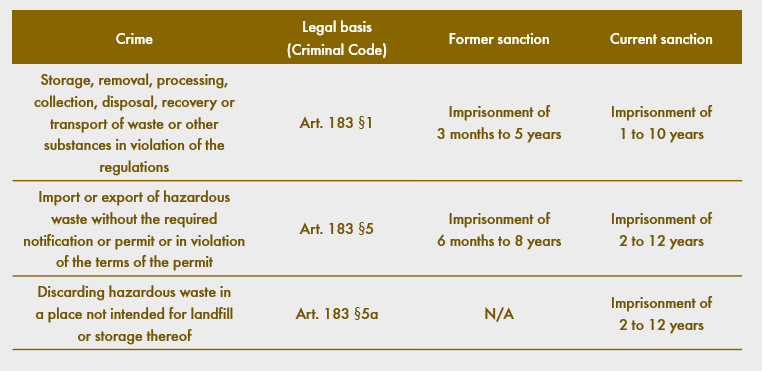Environmental criminal law—current status and prospects
Human activity exerts greater and greater impact on the environment. The resulting environmental degradation also poses numerous threats to human life and health. On top of this, the growing generation of waste causes serious ecological problems, but also creates a space for abuses and criminal activity.
According to the study “Transnational Crime in the Developing World,” environmental offences are among the most profitable. And according to data released by the European Commission, environmental offences are the third-largest area of criminality around the world and are growing at a rate of some 5–7% every year.
In Poland as well, for years we have observed an increase in environmental crime, particularly involving improper handling of waste. An example is the offence defined in Art. 183 of the Criminal Code (improper handling of waste, including for example disposing of waste in landfills in a manner posing a threat to human life or health).
Offences related to mishandling of waste (Criminal Code Art. 183)

This is why it is necessary to establish legal standards providing comprehensive protection for the environment. In this context, provisions of criminal law play a special role as a mechanism deterring and punishing illegal practices. Introducing harsh penalties and effective instruments for enforcing them has become an integral element of the fight against environmental crime.
Criminal liability
Legal liability within the system of environmental protection can take various forms: civil, administrative, and criminal. Criminal liability should be imposed as a last resort.
Criminal liability in Poland broadly includes liability for crimes (przestępstwa) and petty offences (wykroczenia). One of the fundamental distinctions between crimes and petty offences is the societal harmfulness of the act, which is higher in the case of crimes. For this reason as well, the set of penalties provided for crimes and petty offences also differs—harsher for crimes and milder for petty offences.
To constitute a crime, an act must be prohibited under threat of a penalty, by a statute in force at the time of commission of the offence. The act must be unlawful, culpable, and socially harmful beyond a negligible degree (Criminal Code Art. 1).
In turn, a petty offence is a prohibited act punishable by arrest, probation, a fine or a reprimand, pursuant to a statute in force at the time of commission of the offence. The act must also be socially harmful (Petty Offences Code Art. 1).
One peculiarity of environmental law in Poland is that the regulations are spread across different legal acts. Environmental protection is addressed by dozens of statutes, a significant number of which also contain criminal provisions.
EU and international law
Protection of the environment via criminal standards has a long tradition in international law. This is one of the fruits of cooperation between countries, which has evolved over the last several decades.
The United Nations Conference on the Human Environment in Stockholm in 1972 adopted the Stockholm Declaration and Action Plan for the Human Environment. The declaration set forth 26 principles on the environment and development, while the action plan included 109 recommendations. These did not yet rise to the level of criminal provisions, but the Stockholm Conference greatly contributed to the development of international environmental law.
In the context of criminal law, we should also take note of the Convention on the Protection of the Environment through Criminal Law, adopted in Strasbourg on 4 November 1998 by the Committee of Ministers of the Council of Europe. The convention ultimately failed to enter into force due to a lack of ratification, but it nonetheless represented a breakthrough in thinking about the role of criminal law as a measure to combat environmental degradation.
The next step was adoption of Directive 2008/99/EC of the European Parliament and of the Council of 19 November 2008 on the protection of the environment through criminal law. That directive established a catalogue of specific acts whose commission should result in criminal liability in all member states. In the area of waste, the directive covered “the collection, transport, recovery or disposal of waste, including the supervision of such operations and the after-care of disposal sites, and including action taken as a dealer or a broker (waste management), which causes or is likely to cause death or serious injury to any person or substantial damage to the quality of air, the quality of soil or the quality of water, or to animals or plants,” as well as “the shipment of waste, where this activity falls within the scope of Article 2(35) of Regulation (EC) No 1013/2006 of the European Parliament and of the Council of 14 June 2006 on shipments of waste and is undertaken in a non-negligible quantity.”
A major new feature was the express provision in Art. 6 of Directive 2008/99/EC that criminal liability should also be imposed on legal persons. However, the directive did not set any specific penalties. Instead, Art. 5 of the directive employs the general clause, familiar from other EU laws, that member states “shall take the necessary measures” to ensure that the offences in question “are punishable by effective, proportionate and dissuasive criminal penalties.”
The most recent act at the EU level imposing criminal liability for environmental offences is Directive (EU) 2024/1203 of the European Parliament and of the Council of 11 April 2024 on the protection of the environment through criminal law and replacing Directives 2008/99/EC and 2009/123/EC. This directive establishes a new catalogue of twenty environmental offences (where previously there were nine).
Significantly, the new directive sets “minimum maximum” penalties of imprisonment for particular offences (Art. 5(2)) and provides for the possibility of imposing on natural persons who have committed environmental offences an obligation to restore the environment to its previous condition within a given period if the damage is reversible, or pay compensation for the damage to the environment if the damage is irreversible or the offender is not in a capacity to carry out such restoration (Art. 5(3)(a)).
Compared to the earlier regulations, the new provisions are much more precise and restrict the discretion of the member states. The broader catalogue of prohibited acts also underlines the aim of the EU lawmakers to achieve more effective protection of the environment. As the preamble states, “Penalties should be strengthened in order to enhance their deterrent effect, and the effectiveness of the detection, investigation, prosecution and adjudication of environmental criminal offences should be improved” (recital 5 of Directive 2024/1203).
Polish law
Under Polish law, the principal legal act governing the rules and scope of criminal liability is undoubtedly the Criminal Code—in the context of environmental crimes particularly Chapter XXII (Offences against the Environment).
Liability for lesser offences is in turn governed by the Petty Offences Code (in particular Chapter XVII, Offences against Public Facilities, and Chapter XIX, Damage to Forests, Fields and Gardens).
But these are not the only legal acts applicable in this area. Criminal provisions are also found in other environmental acts, such as the Waste Act (Division X, Chapter 1) and the Environmental Protection Law (Title VI, Division II).
The Polish parliament is undoubtedly following trends noticeable at the EU level by tightening criminal liability for crimes and petty offences against the environment. This phenomenon can be observed in particular with respect to criminal liability for improper handling of waste, probably associated with high-profile media reports of incineration of illegally stored or landfilled waste.
An example of the drastic heightening of liability for crimes and petty offences against the environment is the Act of 22 July 2022 Amending Certain Acts to Combat Environmental Crime. It raised many times over the level of potential fines for petty offences against the environment.


It should be evident from just these few examples that Polish lawmakers are taking an approach in line with international trends, reflecting an intensification of efforts to protect the environment. The desire to raise the penalties for environmental offences is consistently justified by the need to deter potential perpetrators and by the growing social awareness of the negative consequences of these offences.
It remains debatable, however, whether such a drastic increase of the potential penalties was necessary, as in some instances the sanctions were raised dozens of times over.
Prospects
In the current legislative perspective, we should not expect to see a departure from the trend to raise sanctions for environmental offences. This is also confirmed by the bill to amend the Nature Protection Act and certain other acts added to the government’s agenda in early May 2025. That bill is expected to be adopted in the fourth quarter of the year.
According to the agenda, changes are planned in the following acts, among others:
- Petty Offences Code, increasing the fines for littering in forests
- Environmental Protection Inspectorate Act, to impose fines on persons preventing or hindering the conduct of field surveys, conservation activities, or measures to eliminate invasive species on private land
- Criminal Code, to increase the penalties for certain environmental crimes.
Bearing in mind that the interests protected by laws criminalising acts against the environment include the environment itself as well as human life and health, efforts to combat such criminal activities by tightening the rules for criminal liability should generally be viewed positively. There is no doubt that the sanctions for actions that can have serious and often long-lasting consequences should be more than merely symbolic.
Harsher sanctions serve a preventive function, discouraging potential perpetrators from violating the law. If the penalties for environmental contamination, particularly improper handling of waste, are adequate to the threat posed to humans and the environment, then entities exploiting the environment should generally be more inclined to comply with the applicable regulations.
It should be stressed, however, that the mere exposure to a penalty is not a sufficient deterrent factor. Effective functioning of law enforcement authorities and the courts is also essential.
A high detection rate and the unavoidability of punishment are factors truly contributing to the effectiveness of the regulations. Only a well-functioning system of legal control and enforcement will ensure that tightening of the regulations is not a purely theoretical exercise, but serves as a realistic tool for protecting society and the environment.
Karol Maćkowiak, Environment practice, Wardyński & Partners
